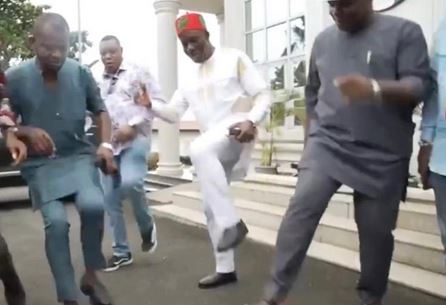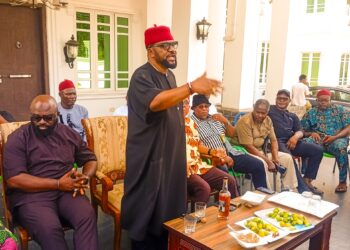Chinedum Treasure
Christian Aburime, Press Secretary to Governor Chukwuma Soludo has replied opponents of his principal who critized his recent “gwo gwo gwo ngwo” dancing with his aides shortly after addressing the press on Anambra 33rd Anniversary of the state.
The All Progressives Congress (APC) Organising Secretary, South East zone, Mr. Dozie Ikedife (jnr) had asked Soludo to get serious with governance and stop dancing.
“All we are asking is for Soludo to stop dancing “gwo gwo gwo ngwo” for Anambra people. Let him do the right thing,” Ikedife jnr added.
But Aburime, in an article titled, “Governor Soludo gwo gwo act as a slice of humanity”, said the governor has not become another dancing politician in a circus, but simply an act of camaraderie and spontaneity.
He said, “When the legendary Igbo folklorist and highlife musician, Sir Mike Ejeagha, released his popular album “Enyi Ga Achi”, he might not have imagined it would undergo a resurgence to become another trending act in modern pop culture. Yet, that is what is happening today in Nigeria. Is it a stroke of serendipity or the creative muse mutating in new ways?

A track in the album, ‘Gwo Gwo Ngwo’, lately took the social media sphere by the storm and assumed a new dance style being re-enacted by people, thanks to Nigerian comic act Brain Jotter who blazed the trail.
In a way, the trending Gwo Gwo dance is an undeniable tribute to the resilient, ever-ebullient, free spirit of the quintessential Nigerian people who keep making the most of dire situations. So, when the Governor of Anambra State, Professor Chukwuma Charles Soludo, CFR, incidentally found himself joining the Gwo Gwo party, he simply struck a chord with his constituents and touched base with culture and humanity. No, he has not become another dancing politician in a circus.
It happened late last month on the day Anambra State celebrated its 33rd anniversary. Governor Soludo, surrounded by his aides after addressing the press on Anambra 33rd Anniversary and the massive progress his administration has made so far within a short period of less than 3 years, spontaneously took a moment off to partake in the viral ‘Gwo Gwo’ dance challenge. Deviating from the norm where political leaders often seem distant and detached, the governor started crooning freely with his aides. Then, as if in choreographic synchronicity, he took that ‘Gwo Gwo’ dance step forward and everyone erupted in hearty laughter.
This simple act of camaraderie and spontaneity offers a refreshing glimpse into a style of leadership that is open, down-to-earth, humane, and deeply in tune with the pulse of popular culture.
For those who may not know Governor Soludo at close range, he has always been a leader without airs. He has always been free with all kinds of people, no matter their social standing or status. He could engage an everyday citizen on the street in light-hearted conversations without any professorial grandstanding. Ever approachable and relatable, despite the height of his office, the wealth of his achievements and the weight of his responsibilities, Governor Soludo remains grounded and practical, capable of infecting people with hope and finding joy in the simple things that bring people together.
Beyond entertaining, Governor Soludo’s dance act serves as a resonant token that even in the face of serious challenges such as we face in Nigeria, there is value in maintaining one’s sense of humour and zest for life. By participating in the ‘Gwo Gwo’ challenge, he implicitly reminds Nigerians to find moments of happiness amidst difficulty, to look for the silver linings in cloudy skies. This approach to leadership, one that acknowledges challenges while also celebrating life’s positive moments, can be a powerful force for resilience and community building.
Critics might argue that such displays are mere political theatrics, designed to distract from more pressing issues. However, such perspective fails to recognise the profound impact that a leader’s deportment and approachability can have on governance. When citizens feel that their leaders are genuinely in touch with their experiences and culture, it fosters trust, encourages civic engagement, and can lead to a more productive understanding between the government and the governed.
As the ‘Gwo Gwo’ challenge continues to sweep across Nigerian social media, while the original album carried proverbial messages about political perfidy and dicey relations between leaders and the led, its resurgence as a lighthearted dance trend speaks volumes about the creative Nigerian spirit. In the face of myriad challenges, Nigerians will continue to find moments of fun and unity through shared cultural experiences.
For in these moments of shared humanity, we find not just entertainment but the seeds of a more connected, understanding, and empathetic society.”





